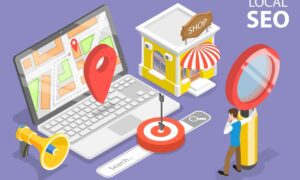Seeking ways to boost your small business’s online presence?
Small enterprises today must secure a strong online presence because it is essential in the digital age. The fact that 79% of the UK population used social media as of early 2025 created unparalleled possibilities for businesses to reach potential customers.
But here’s the problem…
Small business owners experience overwhelm due to the extensive range of digital platforms and strategies they can choose from. Business owners frequently distribute their efforts too thinly across multiple platforms and mistakenly target ineffective channels.
I will demonstrate the precise steps to create a successful online presence for your small business that delivers results.
What You’ll Discover:
- Why Online Presence Matters for Small Enterprises
- Essential Components of a Strong Digital Footprint
- Building Your Website: The Foundation of Your Online Identity
- Social Media Strategies That Actually Work
- Local SEO: Making Your Business Discoverable
- Content Marketing for Small Businesses
- Measuring Success: Key Metrics to Track
Why Online Presence Matters for Small Enterprises
UK small enterprises must establish strong online presences to ensure business survival and growth.
Why? Because that’s where your customers are.
The UK population demonstrates a high internet usage rate at 97.8% while more than 60% of British consumers engage in online transactions through smartphones which indicates active product and service searches by potential customers like yours.
The United Kingdom hosts nearly 5.5 million businesses where small businesses make up 99% of the total. Intense competition exists because businesses without a strategic online presence face the risk of becoming invisible among many market rivals.
The private sector’s employment numbers in 2024 show that small to medium-sized enterprises provide jobs to 16.64 million people which represents 59.94% of total private employment. SMEs can achieve tremendous growth through digital marketing solutions like those from https://dogonthetable.com/.
Essential Components of a Strong Digital Footprint
A complete online presence emerges when multiple critical components function in synergy. Here’s what you need:
Professional Website
The website serves as the digital storefront for your business and creates the initial impression for potential customers. It needs to be:
- Make sure your website is mobile-responsive since 60% of UK consumers access the internet through smartphones.
- Websites that extend beyond three seconds in loading time experience higher abandonment rates from users.
- Clear and intuitive to navigate
- Designed with your target audience in mind
- Optimized for conversions
Active Social Media Presence
54.8 million people use social media in the UK making it an essential channel for businesses to engage with. Avoid trying to maintain a presence on every platform simultaneously. Concentrate your efforts on social media platforms where your intended audience spends most of their time.
Search Engine Optimization (SEO)
Visibility on Google and various other search engines remains essential. For small businesses that operate within particular geographic regions local SEO proves to be essential.
Content Marketing Strategy
Through valuable content your business establishes authority and attracts plus engages prospective customers.
Online Reviews and Reputation Management
Before deciding to buy something, 92% of consumers always check online reviews. Actively managing your online reputation is essential.
Building Your Website: The Foundation of Your Online Identity
Your website functions as the central hub of your online presence by directing traffic to all your digital activities.
Small businesses must ensure their websites achieve an ideal mix of aesthetic design and practical functionality. Here’s how to get it right:
Keep It Simple
Do not use flashy website elements that could reduce its performance. Your website design should prioritize cleanliness while ensuring navigation remains straightforward and calls to action stand out clearly.
Mobile Optimization Is Non-Negotiable
Your website needs optimal performance on mobile devices because the UK expects 62.1 million e-commerce users by 2025.
Focus On Loading Speed
Every second counts. Optimize loading speed by using compressed images and reducing HTTP requests while evaluating hosting options if necessary.
Include Essential Pages
At a minimum, your website should include:
- Homepage (with a clear value proposition)
- About page (telling your brand story)
- Products/Services pages (with detailed information)
- The contact page needs to provide various methods for users to reach you.
- Blog (for ongoing content marketing)
Social Media Strategies That Actually Work
Small businesses can find significant opportunities in social media due to the 38.3 million Facebook users currently active in the UK as of early 2025. Success requires strategic presence instead of just existing on social media.
This guide explains how to optimize social media for your small business’s success.
Choose Platforms Strategically
Direct your marketing activities to the platforms where your target audience spends most of their time. LinkedIn should be your main social media platform if you operate a B2B business. Businesses that focus on visual products should consider using Instagram or Pinterest for better results.
Consistency Over Quantity
Posting high-quality content regularly on a couple of selected platforms is more effective than trying to maintain multiple social media accounts.
Engage, Don’t Just Broadcast
Social media is a two-way street. Join conversations and actively engage with your followers and community while responding to their comments.
Leverage User-Generated Content
Invite customers to post about their experiences with your products or services and display this content on your channels after obtaining their consent.
Local SEO: Making Your Business Discoverable
Small businesses operating within local markets must prioritize local SEO as an essential tool for success. Discover how to make your business visible to local customers during search queries.
Google Business Profile
Develop a complete Google Business Profile (previously known as Google My Business) and optimize all its features. Include:
- Accurate business name, address, and phone number
- Business hours and holiday schedules
- High-quality photos of your business
- Products or services you offer
- Responses to all customer reviews
Local Keywords
Incorporate location-based keywords throughout your website content. Focus your keywords on “handmade jewelry in Manchester” instead of simply “handmade jewelry.”
NAP Consistency
Make sure the Name, Address, and Phone number you use match exactly across all your online profiles and directories.
Content Marketing for Small Businesses
Through content marketing small businesses gain a competitive edge against larger corporations by demonstrating their expertise and delivering valuable content. Here’s how to approach it:
Understand Your Audience
Building comprehensive buyer personas enables businesses to identify which content will connect effectively with their target audience.
Solve Real Problems
Concentrate your content strategy on meeting the actual difficulties and questions faced by your potential customers as well as fulfilling their needs.
Mix Content Formats
Blog posts and videos along with infographics podcasts and case studies function effectively for various audiences based on specific needs and objectives.
Create a Content Calendar
Advance planning of your content will help maintain consistency while meeting business objectives and seasonal opportunities.
Measuring Success: Key Metrics to Track
Understanding the success of your online presence in driving business growth requires measuring results. Here are the key metrics to track:
Website Metrics
- Traffic sources (organic, social, direct)
- Bounce rate
- Time on site
- Conversion rate
Social Media Metrics
- Engagement (likes, comments, shares)
- Follower growth
- Reach and impressions
Email Marketing Metrics
- Open rate
- Click-through rate
- Conversion rate
Use Google Analytics to collect all these website and social media performance metrics in one location.
Putting It All Together
Small enterprises can build a robust online presence by selecting targeted digital marketing tactics instead of trying to use every option available. A strong online presence requires businesses to develop a unified marketing strategy that matches their objectives and targets platforms where their audience is most active.
Establishing a strong online presence requires patience because it takes time and consistent effort. Maintain patience as you track outcomes and adjust your strategy according to data analysis.
Small businesses account for 99% of UK businesses which means intense competition exists alongside abundant opportunities. Through these strategies your small business will create an online presence that connects with your target audience and turns them into loyal customers.
Begin with small efforts but maintain consistent action because each digital interaction presents a chance to demonstrate your business’s unique traits.



































